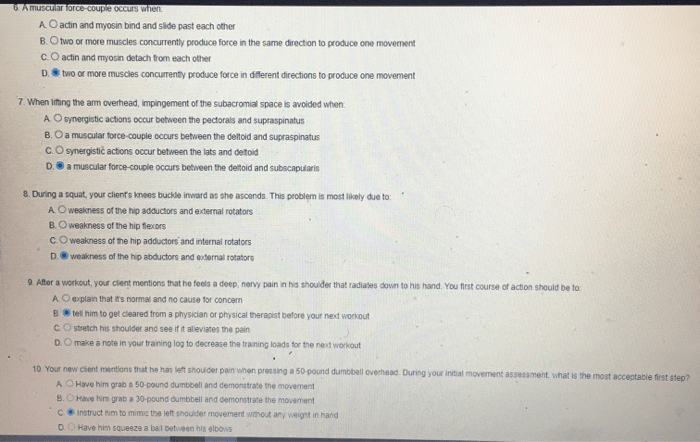Issa corrective exercise specialist final exam answers – Prepare for the ISSA Corrective Exercise Specialist Final Exam with confidence! Our comprehensive guide unveils the essential concepts, assessment techniques, exercise prescription principles, case studies, and ethical considerations you need to master. Dive in and unlock your potential as a skilled corrective exercise specialist.
Delve into the core principles of corrective exercise, understand the intricacies of assessment and evaluation, and learn to design effective exercise interventions tailored to individual needs. Real-world case studies provide invaluable insights into clinical reasoning and evidence-based practice. Explore the ethical and legal responsibilities of corrective exercise specialists and navigate ethical dilemmas with confidence.
1. Issa Corrective Exercise Specialist Final Exam Overview

The Issa Corrective Exercise Specialist Final Exam is a comprehensive assessment designed to evaluate the knowledge and skills of individuals seeking certification as corrective exercise specialists. It covers a wide range of topics essential for professionals working in the field of corrective exercise, including assessment and evaluation techniques, exercise prescription and progression, and ethical and legal considerations.The
exam is structured as a multiple-choice test with approximately 150 questions. The questions are designed to assess the candidate’s understanding of key concepts and principles, as well as their ability to apply these concepts in real-world scenarios.
2. Key Concepts and Principles

The Issa Corrective Exercise Specialist Final Exam covers a wide range of key concepts and principles, including:
-
-*Anatomy and biomechanics
Understanding the structure and function of the human body is essential for corrective exercise specialists to effectively assess and treat movement dysfunctions.
-*Kinesiology
The study of human movement provides corrective exercise specialists with the knowledge to analyze movement patterns and identify deviations from normal.
-*Motor control
Corrective exercise specialists must understand the principles of motor control to develop effective interventions that improve coordination, balance, and stability.
-*Exercise physiology
Knowledge of exercise physiology is essential for corrective exercise specialists to design safe and effective exercise programs that optimize physical function.
-*Pathology
Understanding the causes and effects of common musculoskeletal conditions is essential for corrective exercise specialists to develop appropriate treatment plans.
3. Assessment and Evaluation Techniques: Issa Corrective Exercise Specialist Final Exam Answers

The Issa Corrective Exercise Specialist Final Exam assesses candidates’ proficiency in a variety of assessment and evaluation techniques, including:
-
-*Postural assessment
Corrective exercise specialists must be able to assess posture to identify imbalances and deviations from normal.
-*Range of motion assessment
Assessing range of motion is essential for identifying movement restrictions and developing appropriate stretching and strengthening exercises.
-*Muscle testing
Muscle testing allows corrective exercise specialists to evaluate muscle strength and function.
-*Functional movement screening
Functional movement screening is used to assess movement patterns and identify potential risk factors for injury.
-*Gait analysis
Gait analysis is used to assess walking patterns and identify deviations from normal.
FAQ Explained
What is the purpose of the ISSA Corrective Exercise Specialist Final Exam?
The ISSA Corrective Exercise Specialist Final Exam assesses your knowledge and understanding of the principles and practices of corrective exercise, ensuring your competence in providing safe and effective interventions for clients with movement dysfunctions.
What types of questions are typically asked on the exam?
The exam covers a wide range of topics, including assessment techniques, exercise prescription, case study analysis, and ethical considerations. Questions may be in multiple-choice, true/false, or short answer format.
How can I prepare effectively for the exam?
Thoroughly review the course materials, practice applying concepts through case studies, and utilize study aids such as flashcards and practice tests. Seek guidance from experienced corrective exercise specialists or consider enrolling in a preparatory course.
